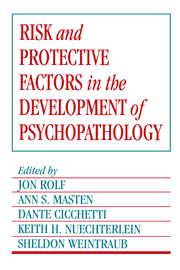Book contents
- Frontmatter
- Contents
- List of contributors
- Preface
- Part I Introduction: Historical and theoretical roots of developmental psychopathology
- Part II Contributions of the high-risk child paradigm: continuities and changes in adaptation during development
- Part III Competence under adversity: individual and family differences in resilience
- 9 Psychosocial resilience and protective mechanisms
- 10 Maternal stress and children's development: prediction of school outcomes and identification of protective factors
- 11 Competence under stress: risk and protective factors
- 12 Stress-resistant families and stress-resistant children
- 13 Children's adjustment to parental divorce: self-image, social relations, and school performance
- Part IV The challenge of adolescence for developmental psychopathology
- Part V Factors in the development of schizophrenia and other severe psychopathology in late adolescence and adulthood
- A closing note: Reflections on the future
- Author index
- Subject index
10 - Maternal stress and children's development: prediction of school outcomes and identification of protective factors
Published online by Cambridge University Press: 06 August 2010
- Frontmatter
- Contents
- List of contributors
- Preface
- Part I Introduction: Historical and theoretical roots of developmental psychopathology
- Part II Contributions of the high-risk child paradigm: continuities and changes in adaptation during development
- Part III Competence under adversity: individual and family differences in resilience
- 9 Psychosocial resilience and protective mechanisms
- 10 Maternal stress and children's development: prediction of school outcomes and identification of protective factors
- 11 Competence under stress: risk and protective factors
- 12 Stress-resistant families and stress-resistant children
- 13 Children's adjustment to parental divorce: self-image, social relations, and school performance
- Part IV The challenge of adolescence for developmental psychopathology
- Part V Factors in the development of schizophrenia and other severe psychopathology in late adolescence and adulthood
- A closing note: Reflections on the future
- Author index
- Subject index
Summary
The extent to which contextual stress in families affects children's development is a research topic that has been given considerable emphasis within the emergent field of developmental psychopathology (Garmezy, 1983, 1984; Garmezy, Masten, & Tellegen, 1984). This chapter presents research findings relating maternal stress and children's school outcomes, conducted as part of the Mother-Child Interaction Research Project at the University of Minnesota. The Mother-Child Project has accumulated data on the role of maternal stress in predicting child maltreatment (Egeland, Breitenbucher, & Rosenberg, 1980; Pianta, Egeland, & Erickson, 1989) and as a factor related to the quality of attachment relationships (Erickson, Sroufe, & Egeland, 1985; Egeland & Farber, 1984). These studies have suggested that maternal stress played a major role in determining certain parenting and child outcomes in this sample. Specifically, in this chapter we present data on the effects of maternal and family psychosocial stress on children's development in the early school years and the factors related to competence in a high-stress subsample. These introductory sections address issues germane to the study of contextual stress and its effects on children.
Risk research and the study of stressful life events
By and large, studies that have examined the role of contextual stress in child development have chosen one of two possible strategies for measuring contextual stress, both of which have certain advantages and disadvantages. The first uses life events scales as measures of general environmental stress, and the second involves identification of subjects on the basis of exposure to a particular stressor, such as divorce (Wallerstein, 1983) or parental mental illness (see chapters 11 and 12 in this volume).
- Type
- Chapter
- Information
- Publisher: Cambridge University PressPrint publication year: 1990
- 52
- Cited by



